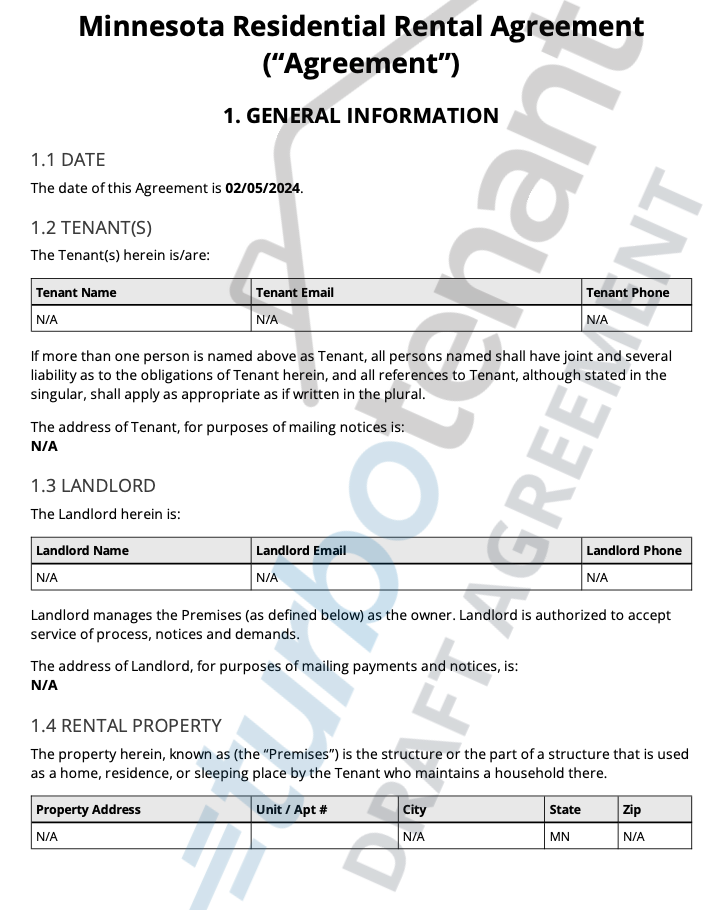
Minnesota lease agreements are essential documents that outline the terms and conditions under which a property is rented. These agreements serve to protect both landlords and tenants by providing a clear understanding of their respective rights and responsibilities. Utilizing tools like TurboTenant’s Minnesota Lease Agreement Generator and Templates ensures that these documents are comprehensive, legally compliant, and tailored to the unique aspects of each rental situation.
Section 1 – Custom to You
Personalization is key when drafting a lease agreement. This section allows landlords in Minnesota to incorporate specific details about their rental arrangement, including the parties involved, rent amount, utility responsibilities, and any additional clauses unique to the property. Customizable elements such as additional provisions and a lost key policy enable landlords to address property-specific rules, local clauses, or other specifics they wish to include, ensuring a comprehensive and clear agreement for both parties.
Key Customizable Elements
- Additional Provisions: Landlords can add any property-specific rules or clauses necessary for their rental situation. Reviewing these additional provisions with a lawyer is recommended to ensure compliance and protect both landlord and tenant rights.
- Lost Key Policy: If tenants fail to return all keys upon moving out, they are required to cover the full cost of rekeying the property. This clause ensures security and peace of mind for landlords.
Section 2 – Specific to Minnesota
To ensure compliance with local laws, this section includes clauses specific to Minnesota that can be edited by the use of our Advanced Editor, but any changes to these provisions could take you out of compliance with legal requirements, so consulting with any attorney about any changes is strongly recommended. . It covers important areas such as late fees, security deposit provisions, and required disclosures, all tailored to meet Minnesota’s legal requirements.
Notable Minnesota Regulations
- Late Fees (Section 2.1): Rent is due in full on the 1st of every month and Landlords can charge a maximum late fee of 8% for late payments if not received by the end of the 5th day, ensuring timely rent collection.
- Security Deposit Provisions (Section 2.4): In Minnesota, there is no limit to the amount a landlord can charge for a security deposit. Landlords are required to pay a simple interest of 1% on the security deposit and return it within 21 days after the tenant vacates the premises, ensuring fairness and transparency in the handling of security deposits.
Essential Disclosures
- Rental Agreement Copy: Landlords are required to provide tenants with a copy of the rental agreement, including proof of receipt. This requirement is satisfied by the lease agreement’s provision, ensuring transparency and mutual understanding of the terms.
- Notice of Eviction Action for Unlawful Detainer
- Notice of Landlord and Tenants Rights and Responsibilities Handbook website location.
- All shared utilities
- Covenant of Landlord and Tenant not to allow unlawful activities
- Inspection and condemnation disclosure
- Financial distress disclosure
Section 3 – General Clauses for Best Practices
This section includes clauses common to most lease agreements, addressing areas such as subletting, property alterations, choice of law, and tenant behavior. These provisions are designed to establish best practices in landlord-tenant relationships, ensuring a smooth and legally sound leasing experience.
Key General Clauses
- Subletting (Section 3.1): Tenants are prohibited from subleasing the property without the landlord’s written permission, maintaining control over occupancy.
- Altering or Improving the Property (Section 3.2): Tenants must obtain written consent before making any alterations or improvements, ensuring the property’s condition is preserved.
- Choice of Law (Section 3.11): The rental agreement is governed by Minnesota law, and both parties consent to the jurisdiction of county courts in which the property is located, providing legal clarity.
- Follow the Law (Section 3.14): Tenants cannot violate any law or ordinance while on the property and must not be a nuisance to neighbors, promoting a peaceful living environment.

FAQ
How much can I charge for a late fee in Minnesota?
In Minnesota, you can charge a late fee of 8% on the unpaid rent if it is not paid by 5pm on the 5th day of each month.
What are the requirements for security deposits in Minnesota?
Minnesota landlords can charge any amount for a security deposit. They are required to pay 1% simple interest on the deposit and return it within 21 days after the tenant vacates the premises.
Do I need to provide a copy of the lease agreement to my tenants?
Yes, Minnesota law requires landlords to provide tenants with a copy of the rental agreement, including proof of receipt, to ensure both parties have access to the agreed terms.
TurboTenant Minnesota Lease Agreements
TurboTenant offers a comprehensive solution for Minnesota landlords to create lease agreements that are not only compliant with state-specific laws but also incorporate best practices for fostering healthy landlord-tenant relationships. By utilizing TurboTenant’s tools, landlords can confidently draft agreements that protect their interests while ensuring legal compliance. For any unique lease provisions, consulting with a legal expert is advisable to ensure these additions comply with Minnesota law and do not conflict with other terms of the lease.
Minnesota Resources


